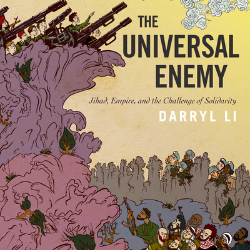
Register for this event:
https://bit.ly/universal-enemy
Please join us for the Fall 2021 event in the New Directions in Middle East and North African Studies series, which will take the form of a dialogue with Darryl Li, Assistant Professor of Anthropology and Lecturer in Law at the University of Chicago, about his recent book The Universal Enemy: Jihad, Empire, and the Challenge of Solidarity (Stanford University Press).
About the book
No contemporary figure is more demonized than the Islamist foreign fighter who wages jihad around the world. Spreading violence, disregarding national borders, and rejecting secular norms, so-called jihadists seem opposed to universalism itself. In a radical departure from conventional wisdom on the topic, The Universal Enemy argues that transnational jihadists are engaged in their own form of universalism: these fighters struggle to realize an Islamist vision directed at all of humanity, transcending racial and cultural difference.
Anthropologist and attorney Darryl Li reconceptualizes jihad as armed transnational solidarity under conditions of American empire, revisiting a pivotal moment after the Cold War when ethnic cleansing in the Balkans dominated global headlines. Muslim volunteers came from distant lands to fight in Bosnia-Herzegovina alongside their co-religionists, offering themselves as an alternative to the US-led international community. Li highlights the parallels and overlaps between transnational jihads and other universalisms such as the War on Terror, United Nations peacekeeping, and socialist Non-Alignment. Developed from more than a decade of research with former fighters in a half-dozen countries, The Universal Enemy explores the relationship between jihad and American empire to shed critical light on both.
About the speaker
Darryl Li is Assistant Professor of Anthropology and Lecturer in Law at the University of Chicago. He works at the intersection of war, law, migration, empire, and race with a focus on transregional linkages between the Middle East, South Asia, and the Balkans. Li has participated in litigation arising from the "War on Terror" as party counsel, amicus, or expert witness, including in Guantánamo habeas, Alien Tort, material support, denaturalization, immigration detention, and asylum proceedings. He is a member of the New York and Illinois bars.
Discussants
Alexander Barna is a PhD student in the Department of History and the Middle East and North African Studies Program at Northwestern. His research interests include modern Islamic intellectual history and political thought. Previously, he was Outreach Coordinator for the Center for Middle Eastern Studies at the University of Chicago and Director of its Middle East Education Initiative.
Henri Lauzière is Associate Professor of History at Northwestern and Director of Undergraduate Studies for the MENA Program. His research interests lie at the intersection of Islamic intellectual history and the political history of Arab societies in both the modern Middle East and North Africa. His first book, The Making of Salafism: Islamic Reform in the Twentieth Century (Columbia University Press, 2016), traces the history of Salafism as a concept and argues against the long-standing but largely mythical narratives of salafiyya embedded in the secondary literature.
Negar Razavi is a Postdoctoral Fellow with the Alice Kaplan Institute for the Humanities at Northwestern and a faculty affiliate of the MENA Program. A political anthropologist, her work focuses on national security, expertise, gender, race, humanitarianism, and U.S. foreign policy in the Middle East. Drawing on over two years of ethnographic research in DC, her research specifically examines the role of policy experts and think tanks in shaping U.S. security policies towards Iran and Egypt. She was previously a Visiting Assistant Professor of Anthropology at William and Mary.
Praise for the book
"The Universal Enemy is original, authoritative, and broad in significance. This remarkable achievement is anchored in Darryl Li's unique combination of skills and sensibilities, which are at once ethnographic, lawyerly, and linguistic." —Brinkley Messick, Columbia University
"In this deeply original book, Darryl Li paints a vivid portrait of jihadist universalism and its mobilization both for and against imperial power. Thought-provoking and beautifully written, The Universal Enemy raises important questions about the legalities, conduct, and effects of global violence in all its forms." —Lauren Benton, Vanderbilt University
"Darryl Li offers superb insight into a figure that shapes so much law and policy but is little understood—the 'universal enemy,' the foreign Muslim fighter. Telling the stories of these mujahids, their motivations and aspirations, with exceptional empathy and detail, he challenges much of what we think we know. The Universal Enemy offers a new and compelling way of understanding universalism and violence, empire and solidarity." —Anthony Anghie, National University of Singapore and University of Utah
Register for this event:
https://bit.ly/universal-enemy
Cost: Free
Audience
- Faculty/Staff
- Student
- Public
- Post Docs/Docs
- Graduate Students
Interest
- Academic (general)
- Global/Multicultural
- Community Engagement